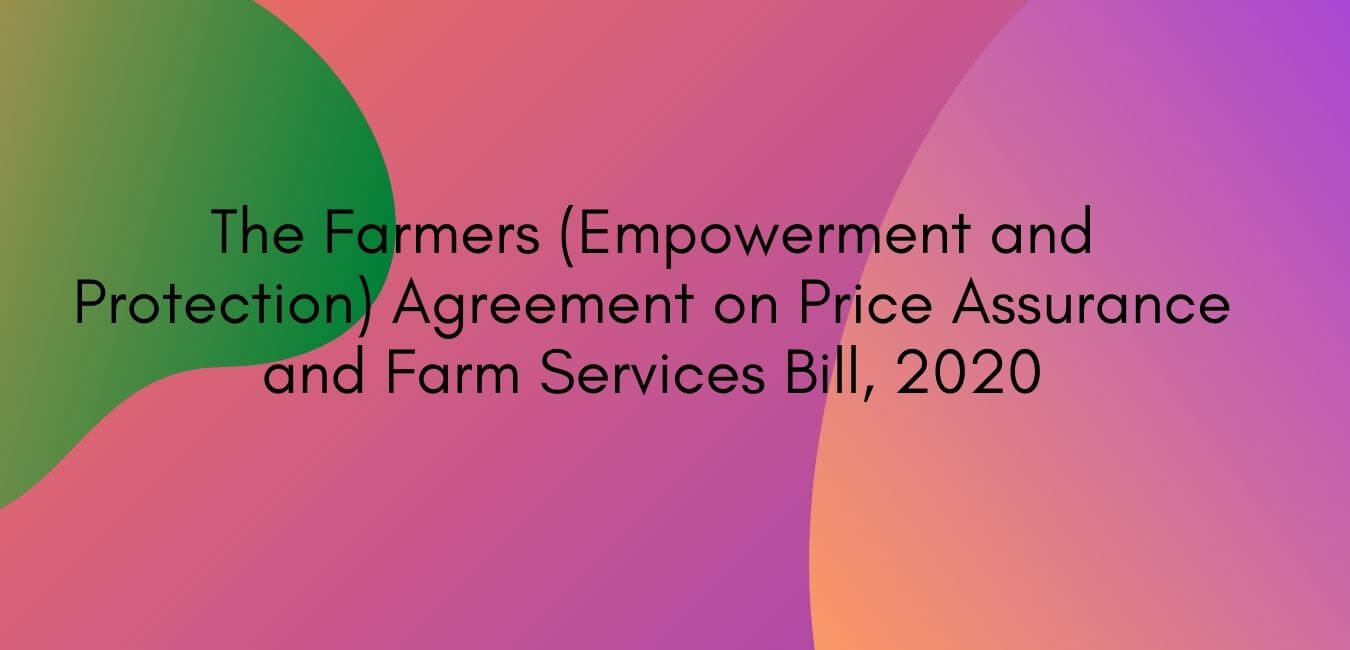The Farmers Agreement on Price Assurance and Farm Services Act, 2020 was brought in with the purpose of offering a national structure to an agreement that strengthens and safeguards the farmers who deal with wholesalers, processors, agri-business firms, exporters or any large retailers. A level of transparency and trading off agricultural products on the basis of an agreement are very critical. The agreement needs to encompass everything regarding the price, parties, delivery procedure, product and the dispute resolution method.
What’s this Farmers agreement all about?
The terms and conditions pertaining to the distribution of the agricultural products such as statutory price, class, quality, time of supply and rest of the relevant matters.
Conditions and assistance regarding the farm service supply.
As per the agreement, an oral agreement is futile. It ought to be in writing in a local language and also, the terms have to be devised in a modest way and an easy lingo for the convenience of all concerned parties. Unless there happens to be a shift, the farming agreement has to meet all the criteria given under the contract law. Therefore, the parties involved in the contract should get into the same freely and satisfy all important things mentioned in the contract.
Length of Farmers Agreement
The least duration of a farming agreement happens to be one crop season, or 1 production cycle of the livestock and the maximum is five years. In circumstances where the production cycle exceeds 5 years, the maximum duration of the farming agreement will be decided mutually between the sponsor and the farmer.
Inputs regarding the sponsor in the Agreement
The sponsor has to supply the inputs to the farmers and the commitments of the sponsor has to be specified in the agreement. Also, the sponsors has to share the mandated inputs like delivery and provide farmers with technical guidance either free of cost or on cost sharing basis. He need to give the inputs at a specific place and time as given in the agreement.
Inputs’ Usage by farmers
The inputs provided by the sponsor have to be validated and examined to determine their quality and quantity by the farmer. In case of any woes experienced by the farmers, they should inform the sponsor in writing. The inputs have to be in line with the instruction specified in the farming agreement and there should not be any deviation from the chief purpose. Further, if there is any kind of loss post delivery, then the entire onus will be on the farmers input. The farmer might return any underutilized inputs by the completion of the production cycle or according to the agreement.
Exemption provided in farmers agreement
In the farming agreement, the agricultural produces are exempted from the legislation aimed at managing the sale and purchase of farm produce. Moreover, these products will also be kept away from the provisions of the Essential Commodities Act, 1955 and confined to the stock limit obligation.
Pricing under farmers agreement
The amount of the farm produce has to be given as per the Farming agreement between sponsor and farmer.
In cases where the price of the produces is variable, the agreement provides the following:
- A specific price needs be paid for such produce.
- Any extra amount beyond the above the guaranteed price such as premium and bonus to justify the ideal value to the farmers and such quoting of the price may be linked to an existing price mentioned in the APMC market or the transaction platform or electronic trading and finally any other apt standard price.
- The method regarding ascertaining the mentioned price shall be in line with the agreement.
Dispute redressal in the Agreement
The agreement regarding the farming needs to make provision for a conciliation board and the conciliation method for addressing the disputes. The board has to make sure that both the parties to the agreement get equal and fair representation. The beginning of any dispute is to refer the same to the resolution board. In case the dispute is not resolved by the conciliation board within 30 days, the either party could seek a resolution from the Sub-Divisional Magistrate. Also, parties reserve the right to appeal against the decision of the Sub Divisional Magistrate. The Appellate Authority and the magistrate have to conclude the dispute in question within 30 days. Further, the appellate authority and the magistrate have got the writ to slap penalties suitable in their view on the party. But, no act or order shall be passed for recovering dues against the agricultural land of the farmer.
Merits pertaining to the farmers’ agreement
This legislation can be beneficial for the farmers as it enables them to deal with the wholesalers, large retailers, exporters etc minus any concerns regarding exploitation. It even works in the favor of the farmers by putting the risk of market uncertainty on the sponsor and also enables the farmer to partake in excellent inputs and contemporary technology. It even aids in enhancing the revenue of the farmer and brings down marketing expenditure.
Also, the farmers will be involved in direct marketing and thereby eliminates the intermediaries and avail the best price available. Farmers are also offered appropriate safeguard from sales, mortgage, and lease of their lands and secured against any kind of recovery.
Conclusion
The government’s intention behind the act is to offer a national and consistent framework on the farming agreement that strengthens and safeguards the farmers and makes them deal directly with exporters, wholesalers, processors and Agribusiness firms. This also cut down the prospects of exploitation as they can sell their products to anyone. This will be beneficial for farmers in enhancing their income and reducing the marketing expenditure. In case of any dispute between the parties, then there is a provision to resolve the same in this act.

